Hit by COVID, Senegal’s women find renewed hope in fishing
Since her birth on Senegal’s coast, the ocean has always given Ndeye Yacine Dieng life. Her grandfather was a fisherman, and her grandmother and mother processed fish. Like generations of women, she helps support her family in the small community of Bargny by drying, smoking, salting and fermenting the catch brought home by male villagers. They were baptized by fish, these women say.
But when the pandemic struck, boats that once took as many as 50 men out to sea carried only a few. Many residents were too terrified to leave home, let alone fish, for fear of catching the virus. When local women managed to get their hands on fish to process, they lacked buyers, as markets shut down and neighboring countries closed borders. Without savings, many families went from three daily meals to one or two.
Dieng is among more than a thousand women in Bargny, and many more in other villages dotting Senegal’s coast, who process fish — the crucial link in a chain that constitutes one of the country’s largest exports and employs hundreds of thousands of its residents.
This story is funded by the European Journalism Centre’s European Development Journalism Grants program, which is supported by the Bill & Melinda Gates Foundation. AP is responsible for all content.
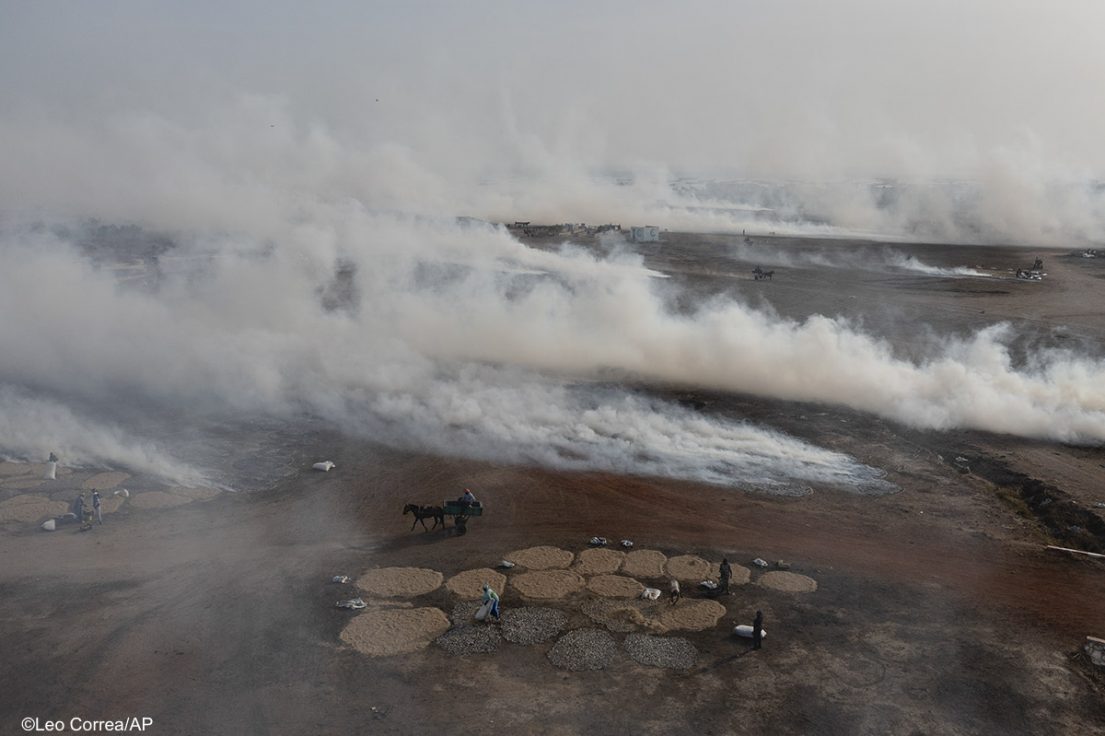
Plumes of smoke from fish processing rise above Bargny beach, some 35 kilometers (22 miles) east of Dakar, Senegal, Wednesday April 21, 2021. In Bargny and other coastal villages of Senegal, traditional fishing and processing of the catch is a livelihood and a pride. Methods have been passed down through generations. Women work as processors drying, smoking, salting and fermenting the catch brought home by men (AP Photo/Leo Correa)

Fishing boats line the shore of Bargny beach, some 35 kilomters (22 miles) east of Dakar, Senegal, Thursday April 22, 2021. In Bargny and other coastal villages of Senegal, traditional fishing and processing of the catch is a livelihood and a pride. Methods have been passed down through generations. Women work as processors — drying, smoking, salting and fermenting the catch brought home by men. (AP Photo/Leo Correa)

Smoked and processed fish is set in a basket after being cleaned and separated by female workers at a processing site on Bargny beach, some 35 kilometers (22 miles) east of Dakar, Senegal, Sunday April 25, 2021. (AP Photo/Leo Correa)

In this April 22, 2021 photo, men wade through the water as they carry the fish cargo from the pirogues that arrived on the shore of Bargny, Senegal. (AP Photo/Leo Correa)

A woman working on a fish processing site walks through the thick smoke coming from burning peanut shells used to cure fish on Bargny beach, some 35 kilometers (22 miles) east of Dakar, Senegal, Wednesday April 21, 2021. In Bargny and other coastal villages of Senegal, traditional fishing and processing of the catch is a livelihood and a pride. Methods have been passed down through generations. Women work as processors, drying, smoking, salting and fermenting the catch brought home by men. (AP Photo/Leo Correa)
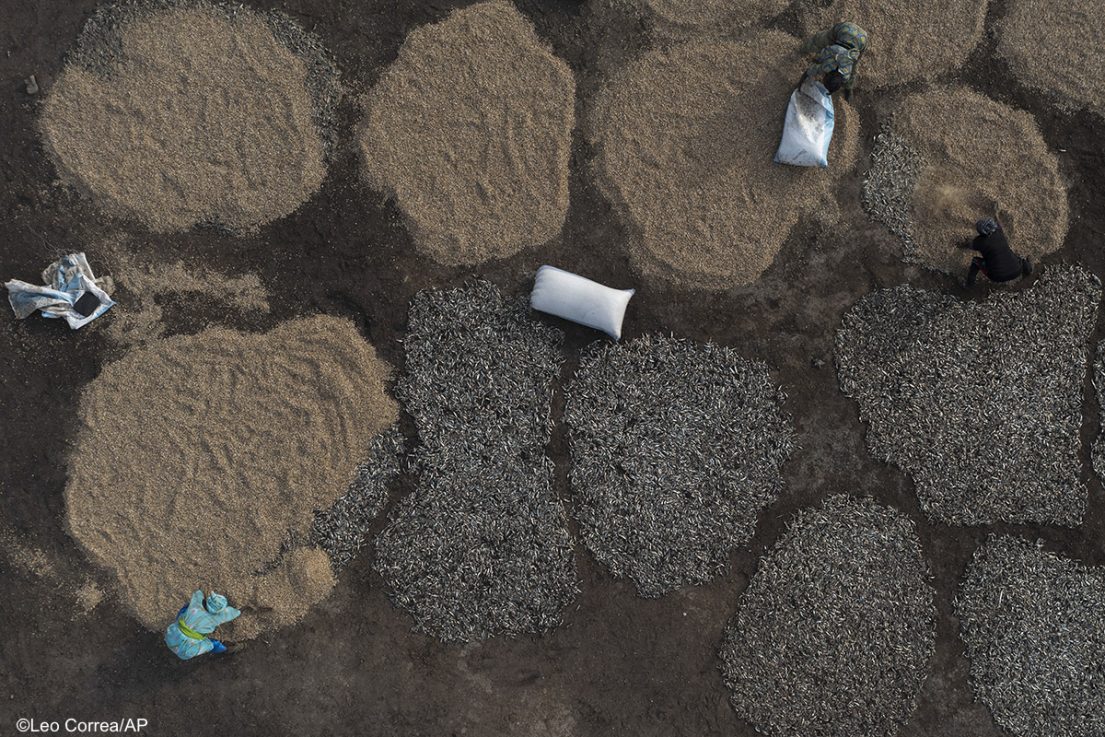
Ndeye Yacine Dieng, lower left, covers fish with peanut shells to process it on Bargny beach, some 35 kilometers (22 miles) east of Dakar, Senegal, Wednesday April 21, 2021. Dieng's grandfather was a fisherman, her grandmother and mother fish processors. They baptized her with money from fish. They taught her the traditions and work of fish processing. (AP Photo/Leo Correa)

A woman works on a fish processing site on Bargny beach, some 35 kilometers (22 miles) east of Dakar, Senegal, Sunday April 25, 2021. (AP Photo/Leo Correa)

A woman gestures as a man unloads his horse-drawn cart of the catch brought by fishermen at Bargny beach, some 35 kilometers (22 miles) east of Dakar, Senegal, Thursday April 22, 2021. (AP Photo/Leo Correa)

Ndeye Yacine Dieng, lower left, covers fish with peanut shells to process it on Bargny beach, some 35 kilometers (22 miles) east of Dakar, Senegal, Wednesday April 21, 2021. Dieng's grandfather was a fisherman, her grandmother and mother fish processors. They baptized her with money from fish. They taught her the traditions and work of fish processing. (AP Photo/Leo Correa)

Ndeye Yacine Dieng, left, spreads the fish on the ground before processing it on Bargny beach, some 35 kilometers (22 miles) east of Dakar, Senegal, Wednesday April 21, 2021. Dieng's grandfather was a fisherman, her grandmother and mother fish processors. They baptized her with money from fish. They taught her the traditions and work of fish processing. (AP Photo/Leo Correa)
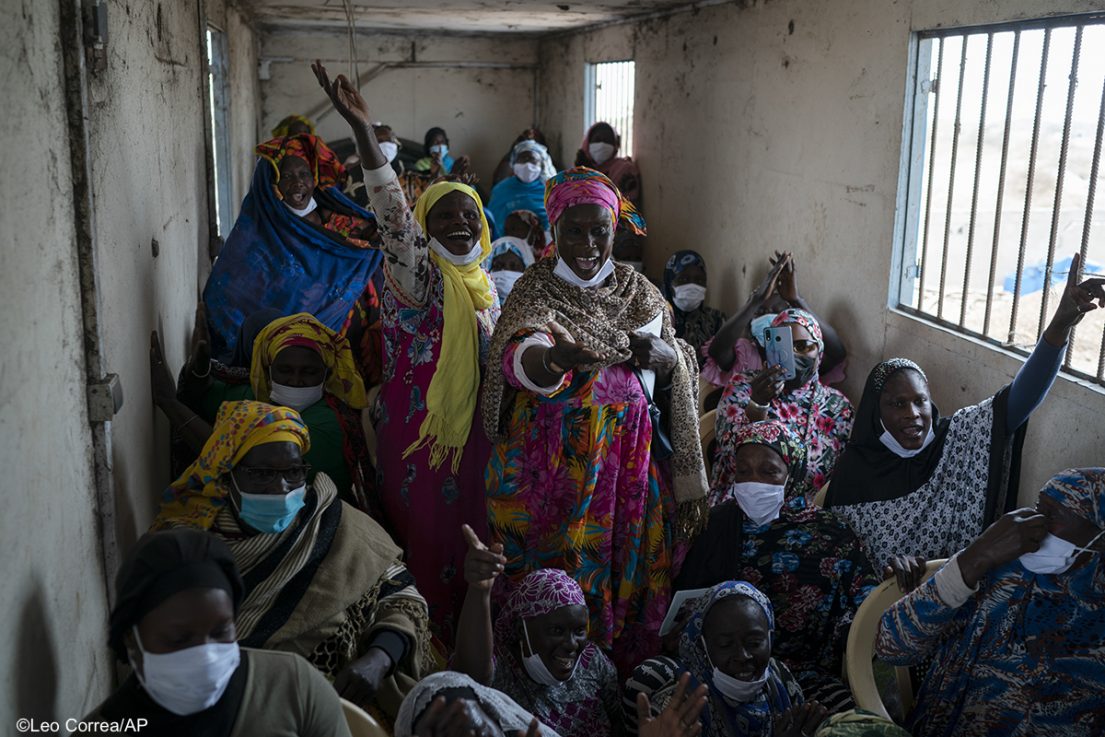
Siny Gueye, center left, is joined by other women fish processors to sing a blessing and thankful song at Bargny beach, some 35 kilometers (22 miles) east of Dakar, Senegal, Thursday April 1, 2021. (AP Photo/Leo Correa)

Ndeye Yacine Dieng talks with her 3-year-old grandson Babacar as she arrives at her home in Bargny, Senegal some 35 kilometers (22 miles) east of Dakar, Senegal, Wednesday April 21, 2021. Since her birth on Senegal's coast, the ocean has always given Ndeye Yacine Dieng life. Her grandfather was a fisherman, and her grandmother and mother processed fish. Like generations of women, she helps support her family in the small community of Bargny by drying, smoking, salting and fermenting the catch brought home by male villagers. They were baptized by fish, these women say. (AP Photo/Leo Correa)
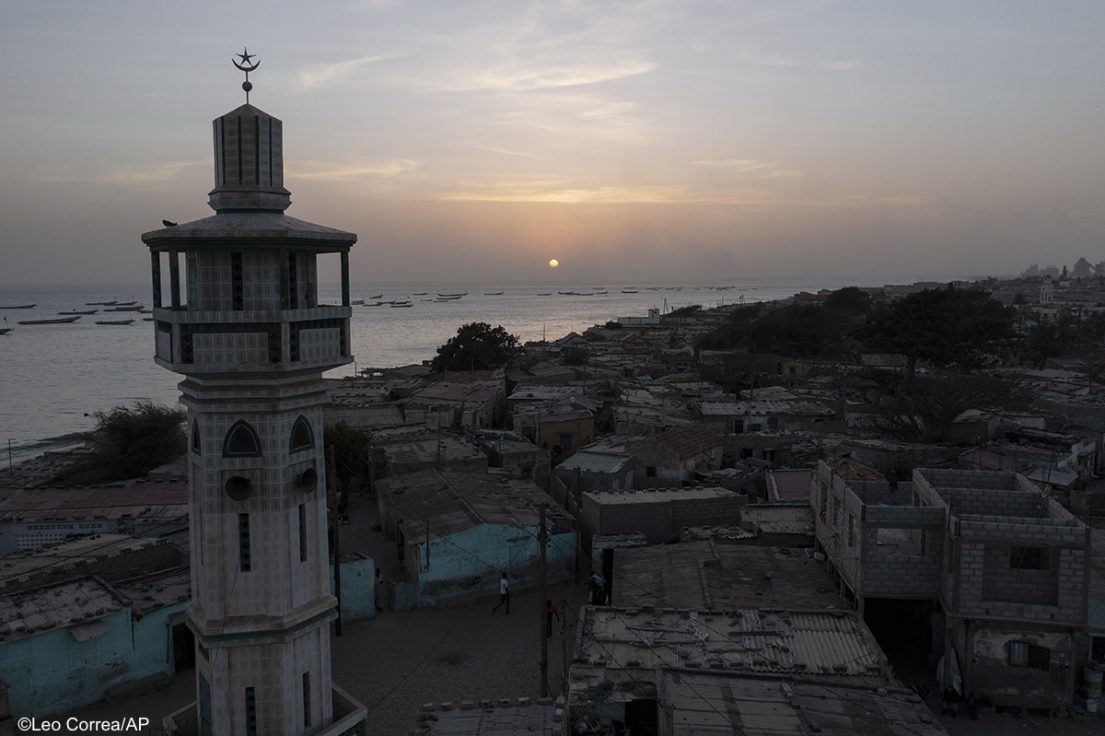
A mosque stands on the sunset in Bargny, Senegal, some 35 kilometers (22 miles) east of Dakar, Senegal, Monday April 26, 2021. (AP Photo/Leo Correa)
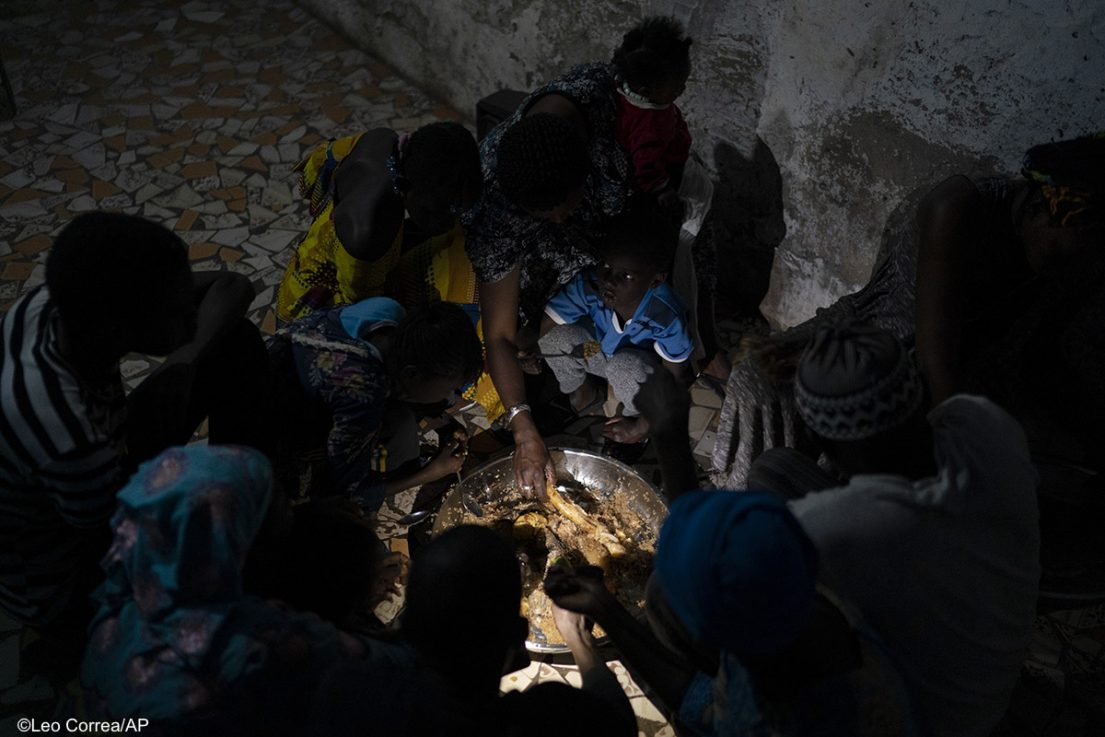
Ndeye Yacine Dieng breaks the fast with her family during the holy month of Ramadan at her home in Bargny, Senegal some 35 kilometers (22 miles) east of Dakar, Senegal, Wednesday April 21, 2021. Since her birth on Senegal's coast, the ocean has always given Ndeye Yacine Dieng life. Her grandfather was a fisherman, and her grandmother and mother processed fish. Like generations of women, she helps support her family in the small community of Bargny by drying, smoking, salting and fermenting the catch brought home by male villagers. They were baptized by fish, these women say. (AP Photo/Leo Correa)

A man walks past pirogues used as fishing boats as the full moon rises over Bargny, Senegal, some 35 kilometers (22 miles) east of Dakar, Senegal, Monday April 26, 2021. The first true fishing season since the pandemic devastated the industry kicked off, bringing renewed hope to the fish processors, their families and the village, even as challenges from coronavirus and more remain. (AP Photo/Leo Correa)

Fishing boats line the shore of Bargny beach, some 35 kilometers (22 miles) east of Dakar, Senegal, Thursday April 22, 2021. In Bargny and other coastal villages of Senegal, traditional fishing and processing of the catch is a livelihood and a pride. Methods have been passed down through generations. Women work as processors — drying, smoking, salting and fermenting the catch brought home by men. (AP Photo/Leo Correa)

Men wait to load their horse-drawn carts with the catch brought by fishermen at Bargny beach, some 35 kilometers (22 miles) east of Dakar, Senegal, Thursday April 22, 2021. In Bargny and other coastal villages of Senegal, traditional fishing and processing of the catch is a livelihood and a pride. Methods have been passed down through generations. Women work as processors — drying, smoking, salting and fermenting the catch brought home by men. (AP Photo/Leo Correa)

Fatou Samba, right, president of the association of female fish processors, carries on her head a basket filled with the remains of processed fish at Bargny beach, some 35 kilometers (22 miles) east of Dakar, Senegal, Sunday, April 25, 2021. Samba is a town councilor and president of the Association of Women Processors of Fish Products, and she's testified about the challenges in artisanal fishing. She hopes to stop much of the expansion of big industry as fishmeal companies scoop up fish and send the product to Europe and Asia. (AP Photo/Leo Correa)
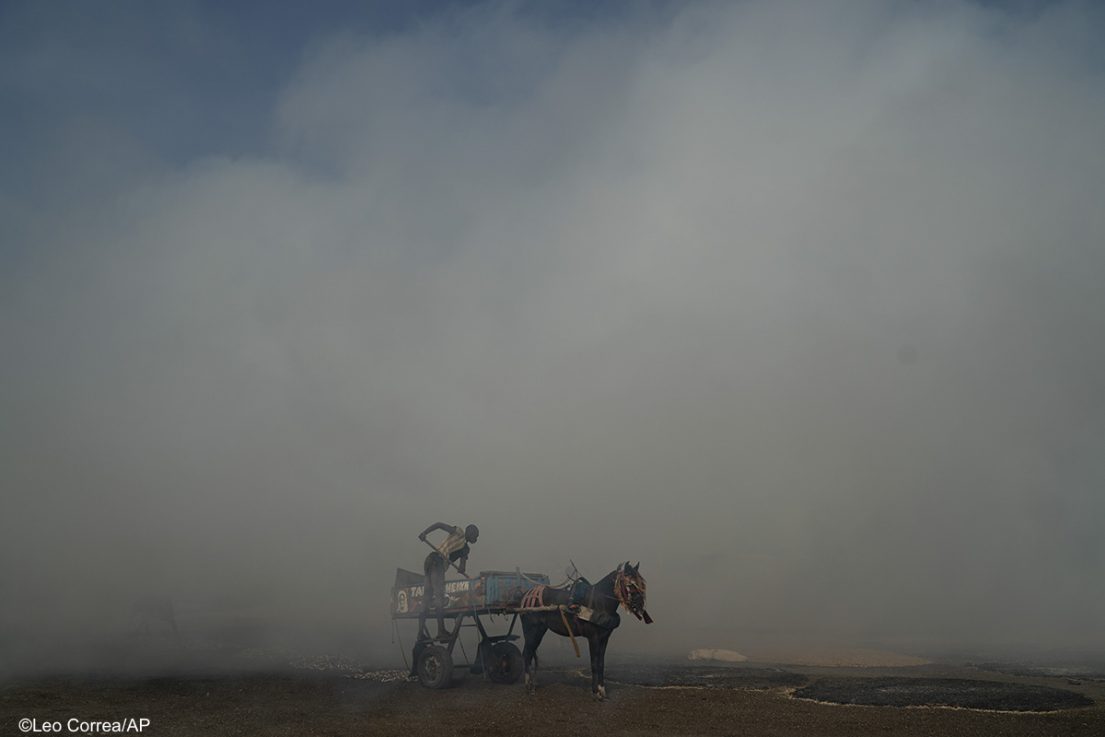
A man unloads his horse-drawn cart of the catch brought by fishermen at Bargny beach, some 35 kilometers (22 miles) east of Dakar, Senegal, Wednesday April 21, 2021. (AP Photo/Leo Correa)

Women carry buckets filled with processed fish on Bargny beach, some 35 kilometers (22 miles) east of Dakar, Senegal, Sunday April 25, 2021. (AP Photo/Leo Correa)

A woman covers fish with peanut shells to process it on Bargny beach, some 35 kilometers (22 miles) east of Dakar, Senegal, Wednesday April 21, 2021. In Bargny and other coastal villages of Senegal, traditional fishing and processing of the catch is a livelihood and a pride. Methods have been passed down through generations. Women work as processors — drying, smoking, salting and fermenting the catch brought home by men. (AP Photo/Leo Correa)

A woman works on a fish processing site on Bargny beach, some 35 kilometers (22 miles) east of Dakar, Senegal, Sunday April 25, 2021. (AP Photo/Leo Correa)

Women working on a fish processing site walk through the thick smoke coming from burning peanut shells used to cure fish on Bargny beach, some 35 kilometers (22 miles) east of Dakar, Senegal, Wednesday April 21, 2021. In Bargny and other coastal villages of Senegal, traditional fishing and processing of the catch is a livelihood and a pride. Methods have been passed down through generations. Women work as processors, drying, smoking, salting and fermenting the catch brought home by men. (AP Photo/Leo Correa)

Ndeye Yacine Dieng looks on at her home after working at the processing site in Bargny, Senegal some 35 kilometers (22 miles) east of Dakar, Senegal, Wednesday April 21, 2021. Since her birth on Senegal's coast, the ocean has always given Ndeye Yacine Dieng life. Her grandfather was a fisherman, and her grandmother and mother processed fish. Like generations of women, she helps support her family in the small community of Bargny by drying, smoking, salting and fermenting the catch brought home by male villagers. They were baptized by fish, these women say. (AP Photo/Leo Correa)

Ndeye Yacine Dieng drops embers over peanut shells covering fish as she walks amidst the smoke on Bargny beach, some 35 kilometers (22 miles) east of Dakar, Senegal, Wednesday April 21, 2021. Since her birth on Senegal's coast, the ocean has always given Ndeye Yacine Dieng life. Her grandfather was a fisherman, and her grandmother and mother processed fish. Like generations of women, she helps support her family in the small community of Bargny by drying, smoking, salting and fermenting the catch brought home by male villagers. They were baptized by fish, these women say. (AP Photo/Leo Correa)
























